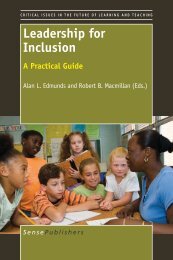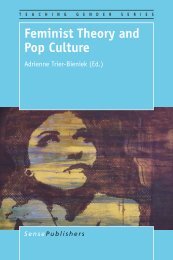RAY LAND, JAN H.F. MEYER AND CAROLINE BAILLIEEDITORS’ PREFACEThreshold Concepts <strong>and</strong> Transformational LearningINTRODUCTIONAt the lower end of the ancient Canongate in Edinburgh there is a worn s<strong>and</strong>stonelintel over a small seventeenth-century doorway. It bears a Latin engraving onwhich is inscribed: ‘Pax intrantibus, salus exeuntibus’. Peace to those who areentering, <strong>and</strong> safety to those about to depart. It is a modest reminder that a <strong>threshold</strong>has always demarcated that which belongs within, the place of familiarity <strong>and</strong>relative security, from what lies beyond that, the unfamiliar, the unknown, thepotentially dangerous. It reminds us too that all journeys begin with leaving thatfamiliar space <strong>and</strong> crossing over into the riskier space beyond the <strong>threshold</strong>. So, too,with any significant transformation in <strong>learning</strong>. As Leslie Schwartzman observeslater in this volume, ‘Real <strong>learning</strong> requires stepping into the unknown, whichinitiates a rupture in knowing’. By definition, she contends, all <strong>threshold</strong> <strong>concepts</strong>scholarship ‘is concerned (directly or indirectly) with encountering the unknown’.For readers new to the idea of <strong>threshold</strong> <strong>concepts</strong> the approach builds on thenotion that there are certain <strong>concepts</strong>, or certain <strong>learning</strong> experiences, which resemblepassing through a portal, from which a new perspective opens up, allowing thingsformerly not perceived to come into view. This permits a new <strong>and</strong> previouslyinaccessible way of thinking about something. It represents a transformed way ofunderst<strong>and</strong>ing, or interpreting, or viewing something, without which the learnercannot progress, <strong>and</strong> results in a reformulation of the learners’ frame of meaning.The <strong>threshold</strong>s approach also emphasises the importance of disciplinary contexts.As a consequence of comprehending a <strong>threshold</strong> concept there may thus bea transformed internal view of subject matter, subject l<strong>and</strong>scape, or even world view.Typical examples might be ‘Personhood’ in Philosophy; ‘The Testable Hypothesis’in Biology; ‘Gravity’ in Physics; ‘Reactive Power’ in Electrical Engineering;‘Depreciation’ in Accounting; ‘Legal Narrative’ in Law; ‘Geologic Time’ inGeology; ‘Uncertainty’ in Environmental Science; ‘Deconstruction’ in Literature;‘Limit’ in Mathematics or ‘Object-oriented Programming’ in Computer Science.In attempting to characterise such conceptual gateways we have suggested inearlier work that they are transformative (occasioning a significant shift in theperception of a subject), integrative (exposing the previously hidden inter-relatednessof something) <strong>and</strong> likely to be, in varying degrees, irreversible (unlikely to beforgotten, or unlearned only through considerable effort), <strong>and</strong> frequently troublesome,for a variety of reasons. These <strong>learning</strong> <strong>threshold</strong>s are often the points at whichix
LAND ET ALstudents experience difficulty. The transformation may be sudden or it may beprotracted over a considerable period of time, with the transition to underst<strong>and</strong>ingoften involving ‘troublesome knowledge’. Depending on discipline <strong>and</strong> context,knowledge might be troublesome because it is ritualised, inert, conceptuallydifficult, alien or tacit, because it requires adopting an unfamiliar discourse, orperhaps because the learner remains ‘defended’ <strong>and</strong> does not wish to change or letgo of their customary way of seeing things.Difficulty in underst<strong>and</strong>ing <strong>threshold</strong> <strong>concepts</strong> may leave the learner in a stateof ‘liminality’, a suspended state of partial underst<strong>and</strong>ing, or ‘stuck place’, inwhich underst<strong>and</strong>ing approximates to a kind of ‘mimicry’ or lack of authenticity.Insights gained by learners as they cross <strong>threshold</strong>s can be exhilarating but mightalso be unsettling, requiring an uncomfortable shift in identity, or, paradoxically,a sense of loss. A further complication might be the operation of an ‘underlyinggame’ which requires the learner to comprehend the often tacit games of enquiry orways of thinking <strong>and</strong> practising inherent within specific disciplinary discourses. Inthis sense we might wish to talk of ‘<strong>threshold</strong> practices’ or ‘<strong>threshold</strong> experiences’that are necessary in the learner’s development.This is our third book on the topic of <strong>threshold</strong> <strong>concepts</strong>. The first, OvercomingBarriers to Student Underst<strong>and</strong>ing: Threshold Concepts <strong>and</strong> Troublesome Knowledge(Meyer <strong>and</strong> L<strong>and</strong>, 2006), drew together the early seminal writings <strong>and</strong> some firstdisciplinary applications of this approach. It offered, in an exploratory fashion,a tentative conceptual framework <strong>and</strong> a lens through which to view the pedagogyof higher education anew. After a lively international symposium on this topic inGlasgow, Scotl<strong>and</strong> in the autumn of 2006, a second volume was published.Threshold Concepts within the Disciplines (L<strong>and</strong>, Meyer <strong>and</strong> Smith, 2008) built <strong>and</strong>exp<strong>and</strong>ed on the first in significant ways. It provided more empirical data concerningthe experience of <strong>threshold</strong> <strong>concepts</strong> <strong>and</strong> troublesome knowledge, particularly fromthe students’ perspective. It also extended the range of disciplinary contexts inwhich <strong>threshold</strong>s had been studied. This encouraged further work to be undertaken,culminating in a second successful international conference in Kingston Ontarioorganised by Caroline Baillie in the summer of 2008, from which this third volumehas taken shape.With Threshold Concepts <strong>and</strong> Transformational Learning the empirical evidencefor <strong>threshold</strong> <strong>concepts</strong> has been substantially increased, drawn from what is nowa large number of disciplinary contexts <strong>and</strong> from the higher education sectors ofmany countries. The central section of this new volume adds to that evidence base,ranging across subjects that include, amongst others, economics, electricalengineering, education, clinical education, sociology, social justice, modernlanguages, law, computer science, philosophy, transport <strong>and</strong> product design, nanoscience,mathematics, biology, history <strong>and</strong> accounting. The authors included herework in colleges <strong>and</strong> universities in the United Kingdom, the USA, Canada,Sweden, Estonia, Australia, New Zeal<strong>and</strong>, Hong Kong <strong>and</strong> the South Pacific. Theopening section of the volume, moreover, challenges <strong>and</strong> extends the theoreticalboundaries of the <strong>threshold</strong>s framework in relation to our underst<strong>and</strong>ing oftransition, liminality <strong>and</strong> the developmental process of <strong>learning</strong>, of conceptualx
- Page 1 and 2: EDUCATIONAL FUTURES: RETHINKING THE
- Page 3 and 4: EDUCATIONAL FUTURESRETHINKING THEOR
- Page 5 and 6: A C.I.P. record for this book is av
- Page 7 and 8: TABLE OF CONTENTS10. Threshold Conc
- Page 9: Pax Intrantibus Salus Exeuntibus. L
- Page 13 and 14: LAND ET ALModePreliminalLiminalPost
- Page 15 and 16: LAND ET AL(Barker, 1991, p.184). Th
- Page 17 and 18: LAND ET ALvariations arising from t
- Page 19 and 20: LAND ET ALform of a model of concep
- Page 21 and 22: LAND ET ALQuestions of intersection
- Page 24 and 25: EDITORS’ PREFACEstudents bring to
- Page 26 and 27: EDITORS’ PREFACEconcepts in the f
- Page 28 and 29: EDITORS’ PREFACEIn the final illu
- Page 30 and 31: EDITORS’ PREFACEhence becomes a n
- Page 32 and 33: EDITORS’ PREFACElearning. This th
- Page 34 and 35: EDITORS’ PREFACEa lens or ‘way
- Page 36 and 37: EDITORS’ PREFACEHence learning is
- Page 38 and 39: EDITORS’ PREFACEthe Communitas, w
- Page 40 and 41: EDITORS’ PREFACEBuilding on these
- Page 42 and 43: EDITORS’ PREFACECousin, G. (2009)
- Page 44 and 45: DAVID PERKINSFOREWORDEntrance…and
- Page 46: FOREWORDMeyer, J.H.F., Land, R. & D
- Page 50 and 51: JULIE A. TIMMERMANS1. CHANGING OUR
- Page 52 and 53: CHANGING OUR MINDSKegan’s (1982)
- Page 54 and 55: CHANGING OUR MINDSKegan describes e
- Page 56 and 57: CHANGING OUR MINDSIn fact, Kegan an
- Page 58 and 59: CHANGING OUR MINDSat the epistemolo
- Page 60 and 61:
CHANGING OUR MINDSMight a learner r
- Page 62 and 63:
CHANGING OUR MINDSreveals an additi
- Page 64 and 65:
CHANGING OUR MINDSBendixen, L. D.,
- Page 66:
CHANGING OUR MINDSSibbett, C., & Th
- Page 69 and 70:
SCHWARTZMANScholarship in liminalit
- Page 71 and 72:
SCHWARTZMANTC: the entityThe term T
- Page 73 and 74:
SCHWARTZMANA resource for teaching
- Page 75 and 76:
SCHWARTZMANunprecedented to attract
- Page 77 and 78:
SCHWARTZMANspectrum of scholarship
- Page 79 and 80:
SCHWARTZMANrupture and phenomenolog
- Page 81 and 82:
SCHWARTZMANfield(s) of one’s cons
- Page 83 and 84:
SCHWARTZMAN36DATA: PARTICULARS GIVI
- Page 85 and 86:
SCHWARTZMANchallenge than interpret
- Page 87 and 88:
SCHWARTZMANStrategies for Teaching:
- Page 89 and 90:
SCHWARTZMANThey are redefined here
- Page 91:
SCHWARTZMANLoder, J. (1981). The tr




